September 10, 2025
The Critical Need for Early Action in Autism Spectrum Disorder
Autism Spectrum Disorder (ASD) is a lifelong condition that, if left untreated, can significantly affect an individual’s quality of life, development, and social functioning. Recognizing the importance of early diagnosis and intervention is essential to prevent adverse outcomes and promote optimal growth and independence across the lifespan.
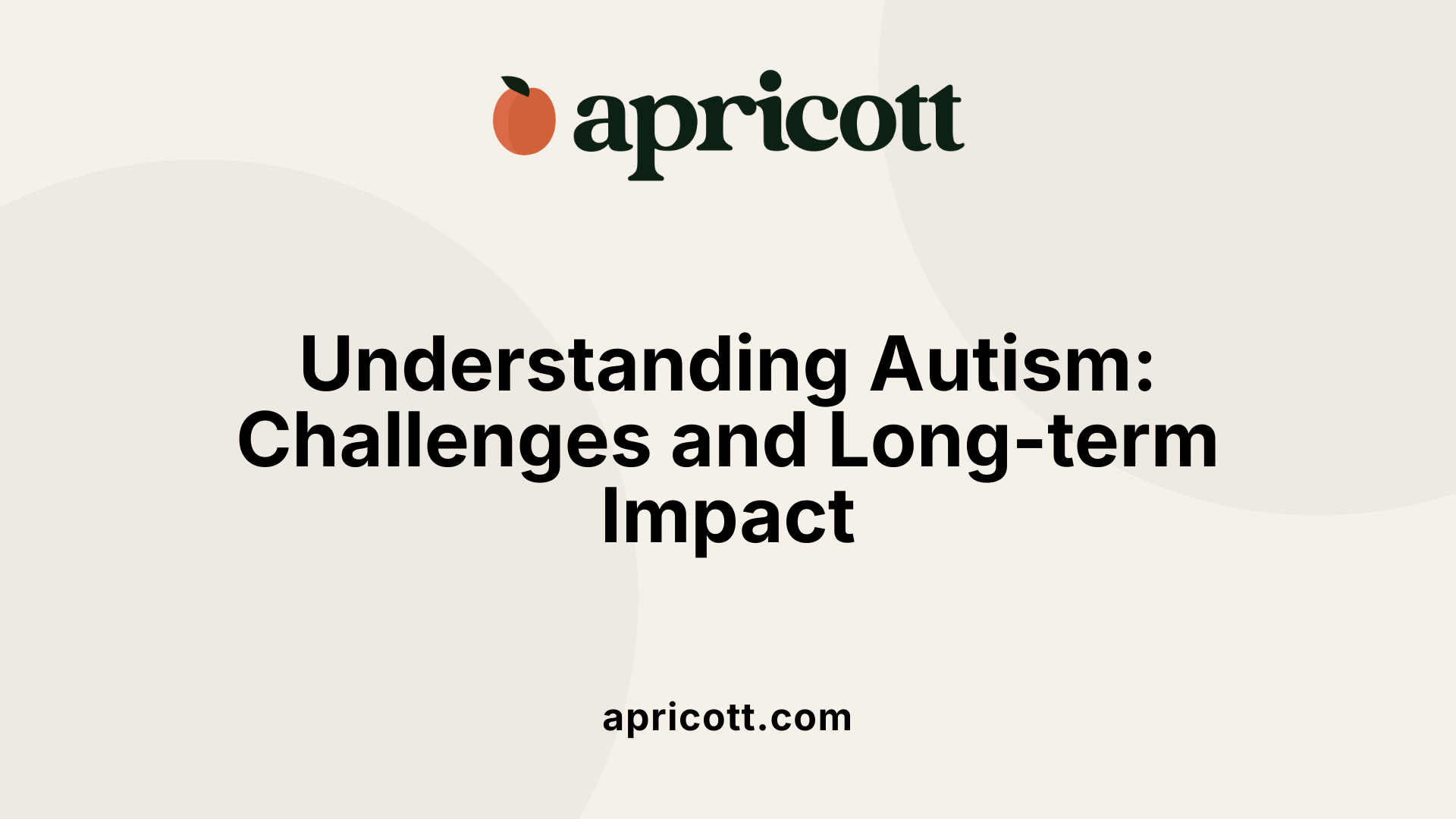
Untreated ASD tends to lead to ongoing difficulties in social communication, daily living skills, and behavioral management. Over time, these challenges can become more pronounced, making it harder for individuals to participate fully in community life.
Without early intervention, many individuals face persistent issues such as limited language development, social withdrawal, and behavioral problems like repetitive movements or self-injury. These symptoms hinder the development of meaningful relationships, employment prospects, and independence.
Untreated autism is also associated with numerous co-occurring health conditions. Many individuals experience gastrointestinal problems, such as constipation and abdominal pain, which can affect their overall health and sleep quality.
Additionally, a significant number of individuals with untreated ASD develop mental health issues such as anxiety, depression, or obsessive-compulsive behaviors. About 50% to 91% of children with autism also have other conditions like epilepsy or ADHD, further complicating their health management.
The long-term outlook worsens without appropriate support and intervention. Many individuals do not reach their full potential in education or employment, resulting in lower life satisfaction and increased dependency. Moreover, untreated autism heightens risks of social isolation, mental health deterioration, and reduced quality of life.
Early diagnosis and targeted, evidence-based therapies like ABA and speech interventions are crucial. These treatments improve communication, social skills, and adaptive behaviors, paving the way for better integration and independence.
Overall, not addressing autism early can lead to a cycle of escalating difficulties, decreased participation in society, and poorer health outcomes. Recognizing and acting promptly offers the best chance for positive long-term results for individuals on the spectrum.
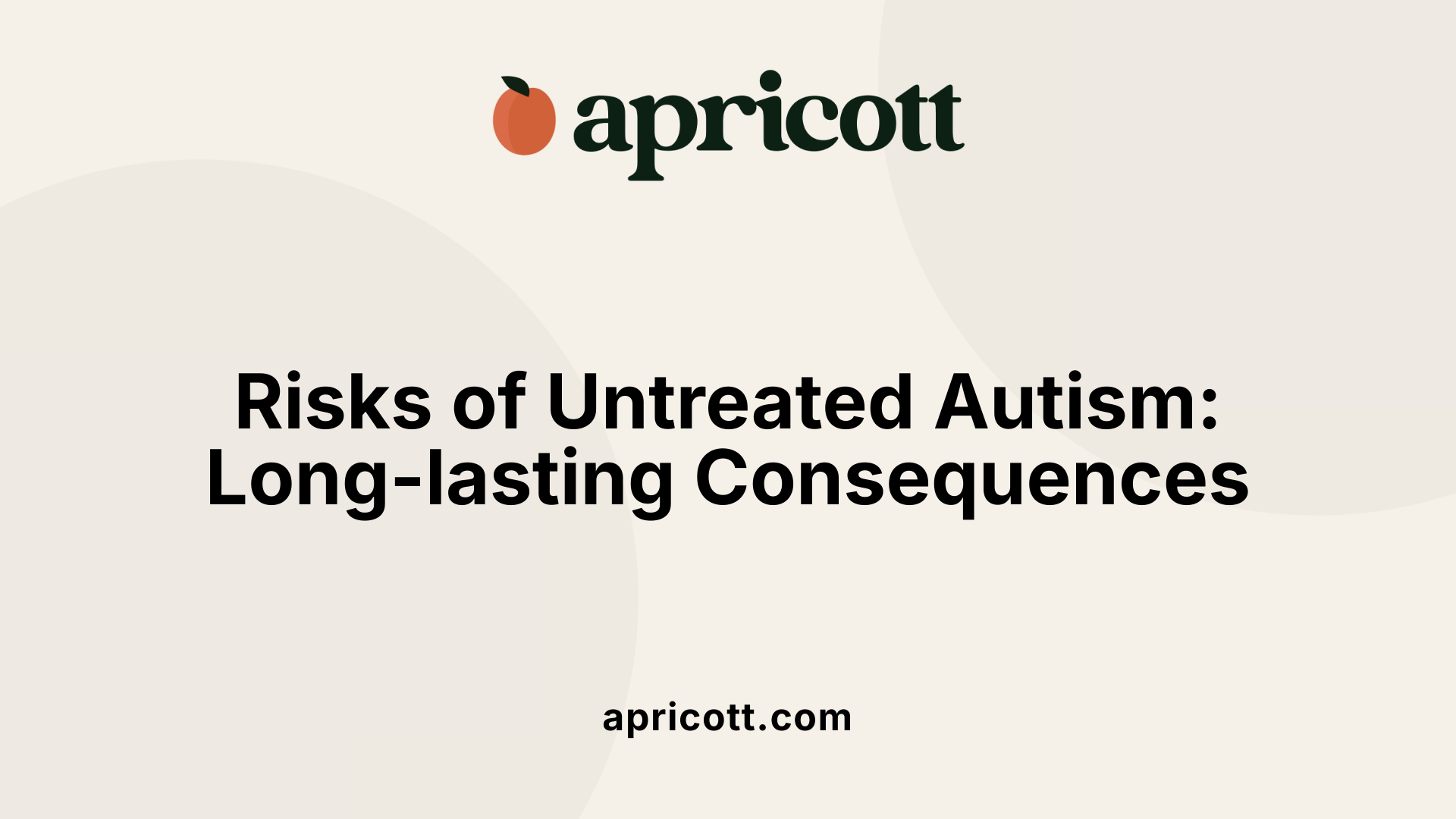
Choosing not to pursue treatment for autism spectrum disorder can have serious, long-lasting impacts. Without intervention, children and adults may face persistent challenges in social interactions and communicating effectively. These difficulties often lead to social isolation and loneliness, making it harder for individuals to build and sustain meaningful relationships.
Behaviorally, untreated autism can result in elevated levels of repetitive behaviors, emotional distress, and challenging behaviors like aggression or self-injury. As they grow older, individuals may experience increased frustration and difficulties managing daily routines, which can further impair their ability to function independently.
From a health perspective, untreated autism is associated with a higher incidence of secondary medical issues. Common co-occurring conditions include sleep disorders, epilepsy, gastrointestinal problems, and mental health conditions such as anxiety, depression, and ADHD. These health challenges can compound the difficulties felt in daily life, influencing overall well-being.
Education and employment prospects are also significantly affected. Many individuals with untreated autism struggle in academic settings, often due to difficulties understanding instructions or social demands. This hampers educational attainment, which is crucial for securing stable employment and achieving independence.
Long-term, untreated autism can lead to a cycle of increasing dependency, reduced life opportunities, and diminished quality of life. Many adults with untreated autism rely heavily on caregivers or social services. The inability to develop social, communication, and adaptive skills often restricts their capacity to live independently or in their own homes.
In summary, not addressing autism's symptoms does not only impact day-to-day functioning but also elevates risks for mental and physical health problems. Early diagnosis and intervention are vital to mitigate these adverse outcomes, improve quality of life, and foster greater independence.

Untreated autism can lead to a significant worsening of core symptoms. Children and adults may experience increased difficulty with social interactions, plain communication, and managing everyday routines. Behavioral issues such as repetitive movements, aggression, and self-injury can become more severe if not addressed early.
In addition to worsening core symptoms, there is a higher likelihood of developing secondary health problems. Many individuals may encounter mental health challenges, including depression, anxiety, and obsessive-compulsive behaviors. Physical health issues such as sleep disturbances, gastrointestinal problems like constipation or abdominal pain, and neurological conditions like epilepsy are more prevalent in untreated autism.
Behavioral and emotional regulations often deteriorate without proper intervention. This can result in heightened frustration, increased emotional outbursts, and greater social withdrawal. As a consequence, individuals face difficulties in maintaining relationships, securing employment, and participating in community life.
The absence of early diagnosis and sustained support also increases the risk of neglect, exploitation, and abuse, especially when social and communication difficulties hinder their ability to advocate for themselves.
Overall, failure to treat autism can significantly impair quality of life, leading to greater dependency on caregivers, decreased independence, and a higher likelihood of mental and physical health issues. The longer symptoms remain unaddressed, the more challenging it becomes to manage and mitigate these risks.
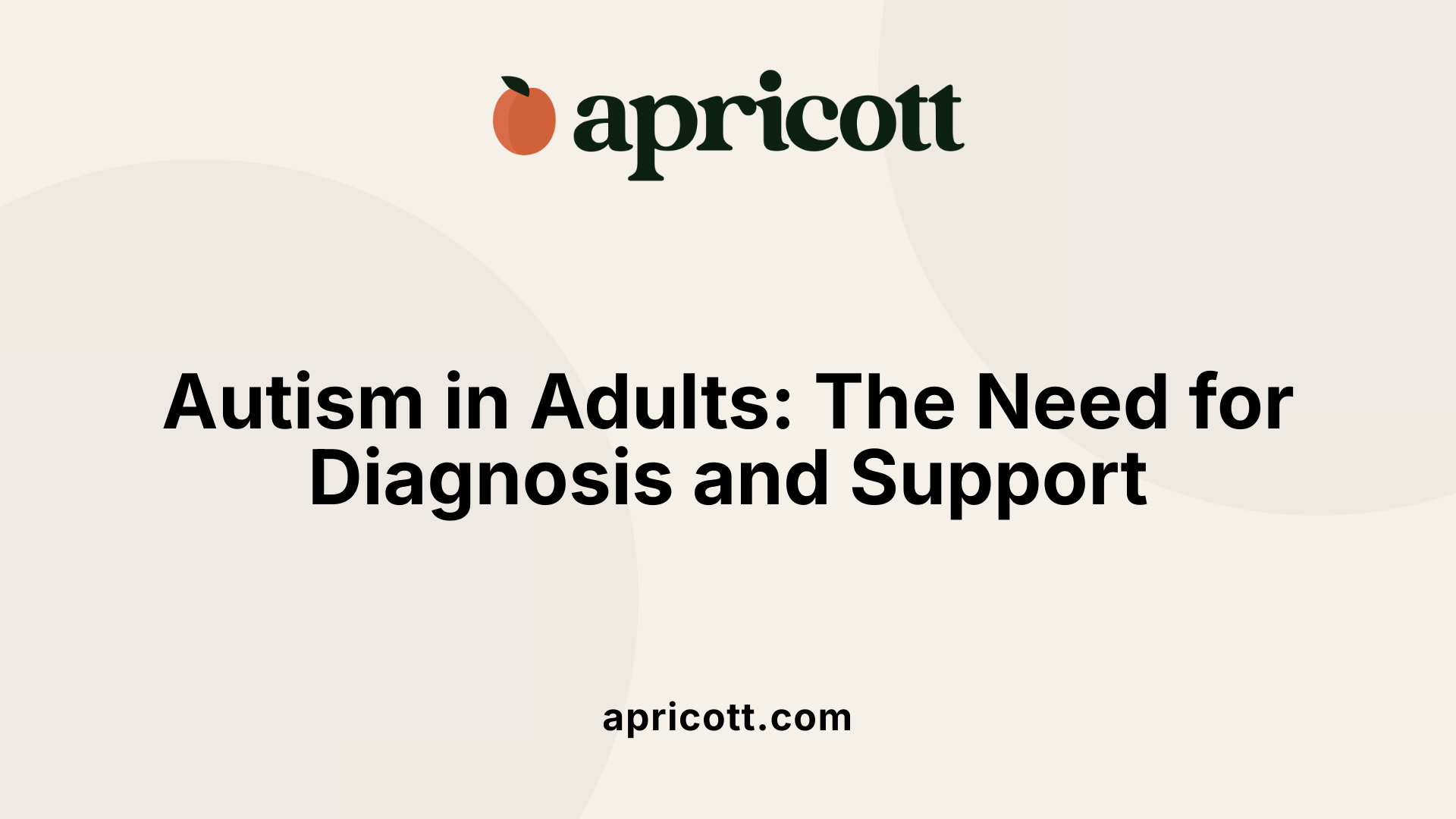
Many adults with autism remain undiagnosed, which can significantly impact their daily lives. Without proper identification, they often face persistent social difficulties, including challenges in establishing and maintaining relationships, managing social cues, and understanding others' perspectives.
Mental health issues such as anxiety, depression, and low self-esteem are common among unrecognized adults with autism. These difficulties may lead to increased isolation and feelings of frustration. In addition, many adults struggle with employment, often finding it hard to adapt to workplace norms or communicate effectively, which reduces opportunities for career advancement and job retention.
A notable concern for undiagnosed individuals is the struggle with independence. They may depend heavily on family or caregivers for support with daily activities. This dependence can hinder their ability to live independently or in their own homes.
Females, in particular, are at risk of remaining undiagnosed because they often mask or camouflage their symptoms, making it harder for clinicians to recognize autism. This masking can lead to delayed diagnosis and treatment, further exacerbating social and emotional challenges.
Early diagnosis plays a crucial role in improving outcomes. When autism is identified early, individuals can access targeted interventions, therapies, and support systems that help improve social skills, emotional regulation, and overall quality of life. Early intervention can also assist in building skills necessary for greater autonomy.
Overall, recognizing autism in adults is vital. With proper diagnosis and support, adults can better manage their challenges, access accommodations, and improve their mental health, leading to a more fulfilling and independent life.
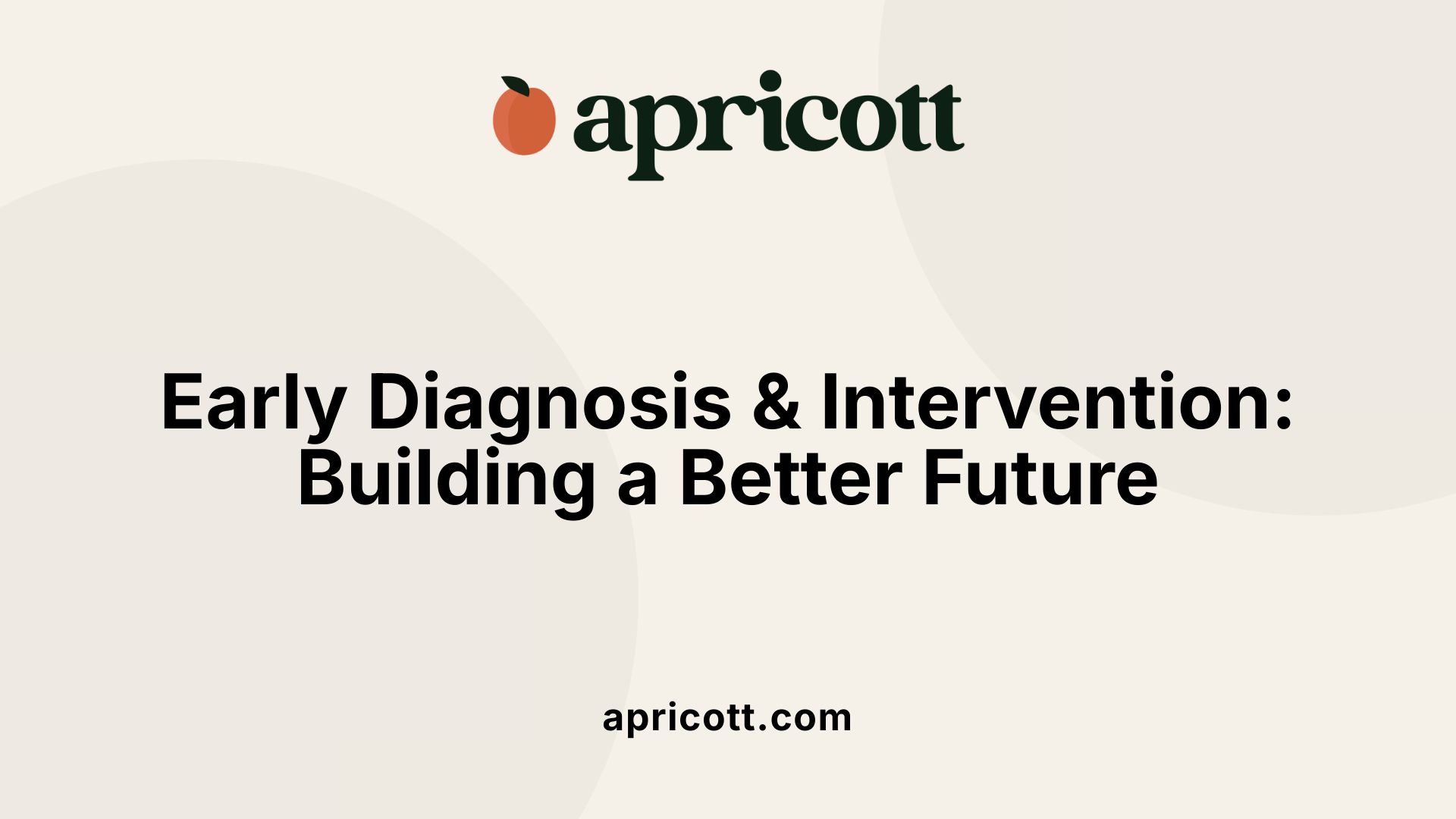
Early diagnosis and intervention play a vital role in shaping the developmental outcomes of children with autism spectrum disorder (ASD). The brains of young children exhibit high plasticity, meaning they are especially receptive to learning and change. When autism is identified early, often before the age of 2, children can benefit from therapies that support their communication, social skills, and behavior—potentially preventing regression and fostering growth.
Timely intervention can significantly improve language development, social interactions, and adaptive skills. It also helps address behavioral challenges, enabling children to better manage routines and emotions. The earlier these supports begin, the greater the chance of achieving meaningful progress.
Several therapies proven effective for young children with autism are commonly used. Applied Behavior Analysis (ABA) is one of the most well-known, designed to reinforce positive behaviors and reduce problematic ones through structured teaching. The Early Start Denver Model (ESDM) is a naturalistic approach that integrates behavioral principles into play-based activities, making learning engaging.
Speech and occupational therapies are often included to improve language skills and daily living abilities. Social skills training helps children understand social cues and develop peer relationships. Family coaching and support empower caregivers to implement strategies at home, making interventions more consistent and effective.
Most intervention programs are tailored to each child's individual needs and are delivered in familiar settings like the home or preschool, ensuring relevance and comfort.
In conclusion, early detection and comprehensive intervention maximize developmental potential and improve long-term outcomes, leading to a better quality of life for children with autism.

Applied Behavior Analysis (ABA) therapy is one of the most widely used interventions for young children with autism. It focuses on improving specific behaviors such as communication, social skills, and learning abilities. ABA uses positive reinforcement techniques to encourage desired behaviors and reduce challenging behaviors. When introduced early, ABA can significantly boost language development, social interaction, and adaptive skills, setting a foundation for better long-term outcomes.
Speech therapy helps children with autism improve their language abilities, which are crucial for communicating effectively and building relationships. Social skills therapies complement this by teaching children how to interpret social cues, engage in reciprocal interactions, and develop friendships. Early access to these therapies promotes better social integration, reduces frustration, and enhances overall quality of life.
Families are integral to successful intervention. Parental participation in therapy sessions and at-home activities reinforces learned skills and behaviors. Support for caregivers, including training and resources, empowers families to create nurturing environments that foster development. Early family involvement has been linked to more positive outcomes, as it ensures consistency and promotes generalization of skills across settings.
Research indicates that early intervention—ideally before age 2—leads to less severe symptoms and better adaptation to everyday environments. It enhances communication, social skills, and independence, and can even reduce the need for more intense support later in life. Programs such as ABA, speech, and social skills training are most effective when combined with family participation and community support.
| Intervention Type | Primary Focus | Benefits | Additional Notes |
|---|---|---|---|
| ABA Therapy | Behavior modification | Improved communication and social skills, reduced behavioral problems | Often tailored to individual needs |
| Speech Therapy | Language acquisition | Better verbal skills, comprehension, and expressive communication | Early initiation yields best results |
| Social Skills Training | Interaction and relationships | Enhanced peer interactions, reduced social anxiety | Usually delivered in group settings |
While early intervention strategies are not cures, they dramatically improve long-term functional outcomes for children with autism. Continued research and personalized approaches ensure that individuals receive the support they need to lead more independent and fulfilling lives.

Children with autism often experience delays in reaching developmental milestones, especially in speech and social interaction. They might start speaking later than usual, have difficulty forming peer relationships, and struggle with understanding social cues like eye contact and facial expressions.
These delays can hinder their ability to communicate effectively, impacting both their social world and learning opportunities. For example, limited language skills can make classroom participation challenging and reduce their chances for peer interactions.
Developmental delays often lead to academic struggles. Children with autism may find it hard to follow instructions, engage in classroom activities, or complete assignments without additional support. Increased behavioral challenges, such as repetitive behaviors or difficulty with transitions, can further impede learning.
Without tailored educational plans and interventions, these children risk falling behind their peers, which can affect their self-esteem and future opportunities.
Yes, early intervention plays a vital role in mitigating some effects of developmental delays. Programs like speech therapy, social skills training, and behavioral therapies such as ABA have shown promising results.
With appropriate support, many children with autism can develop essential communication and social skills, improving their ability to participate actively in school and social environments. Over time, these interventions can enhance their independence and quality of life.
| Aspect | Impact of Delays | Interventions Effectiveness | Expected Outcomes |
|---|---|---|---|
| Speech and language | Difficulties in communication | Speech therapy, AAC devices | Improved language skills and expression |
| Social skills | Challenges in peer interactions | Social skills groups, therapy | Better social integration |
| Academic performance | Struggles with instructions, focus | Individualized Education Programs (IEPs), assistive technology | Enhanced learning and participation |
| Behavioral regulation | Repetitive behaviors, frustration | ABA, behavioral strategies | Better self-regulation and independence |
Understanding these stages underscores the importance of early, targeted support to load children with autism with the skills they need for future success.

Community programs have become a vital part of improving life for individuals with autism. Increased access to social activities and employment programs helps foster independence and build social skills.
Many workplaces are adopting inclusive practices, creating job roles tailored to individual skills. This approach not only promotes financial independence but also boosts self-esteem and social engagement.
Support networks involving families and community organizations provide essential encouragement and resources. Family participation in therapy and social activities enhances progress and stability.
Programs such as supported employment, social skills training, and recreational activities help individuals with autism develop meaningful relationships and adaptive skills.
Engagement in community activities reduces feelings of isolation. It offers a sense of belonging and purpose, which significantly impacts mental health.
Inclusion initiatives, like inclusive education and community events, are crucial for normalizing interactions and encouraging acceptance.
| Aspect | Benefits | Additional Details |
|---|---|---|
| Social Opportunities | Build communication skills, foster friendships | Local clubs, groups, and community sports |
| Employment | Promote independence, skill development | Supported work programs, job coaching |
| Family Support | Improve emotional well-being, stability | Support groups, family training sessions |
| Community Involvement | Reduce stigma, increase acceptance | Community events, public awareness campaigns |
Investing in community support and inclusive practices not only enhances individual outcomes but also benefits society by fostering diversity and understanding.
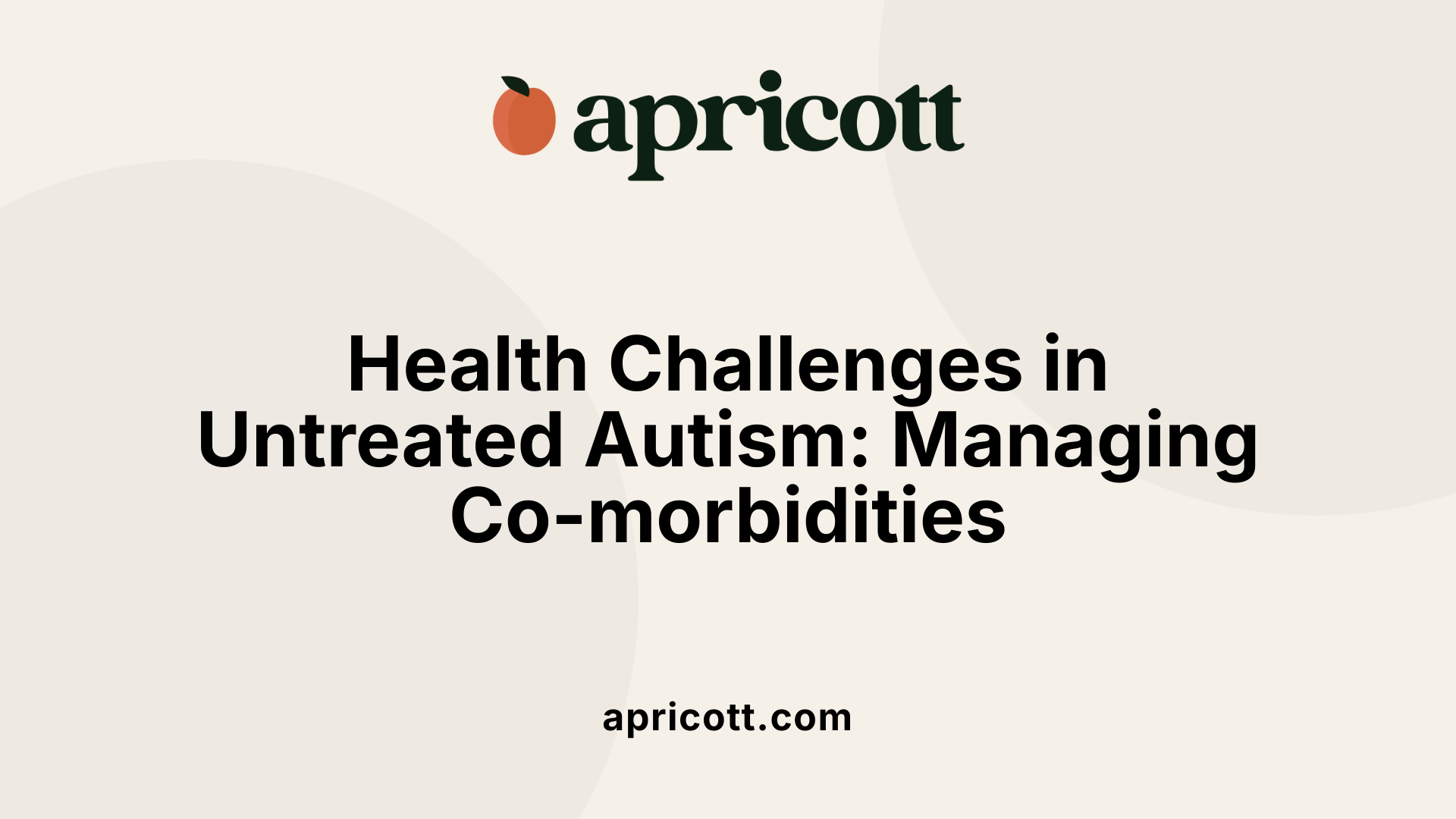
Untreated autism often co-occurs with various medical conditions that can significantly impact an individual's overall health. Among these, gastrointestinal problems are particularly prevalent. Up to 70% of autistic children experience issues such as chronic constipation, abdominal pain, gastroesophageal reflux, and bowel inflammation. These gastrointestinal issues can cause discomfort, sleep disturbances, and behavioral challenges.
Epilepsy is another common condition, affecting about 5% of autistic children and 12.1% of autistic adults on Medicaid. Signs of epilepsy include unexplained staring spells, involuntary movements, confusion, and severe headaches. If untreated, epilepsy can lead to further brain damage and increased health risks.
Sleep disturbances are widespread among children with autism, affecting 50% to 80%. These sleep problems include difficulties falling asleep, frequent night awakenings, and irregular sleep patterns, which can worsen autism symptoms such as irritability and inflexibility.
Autism often comes with additional health concerns, like feeding issues which affect up to 70% of autistic children. These include food selectivity, food aversions, and pica, often driven by hypersensitivities. Sleep problems and gastrointestinal issues also contribute to lowered quality of life.
The presence of co-occurring conditions complicates healthcare management and can lead to more severe health challenges if left untreated. For example, epilepsy can cause ongoing neurological damage without proper control.
Behavioral and mental health conditions such as anxiety, depression, OCD, and schizophrenia are common. If unaddressed, these can lead to increased behavioral difficulties, self-injury, and emotional distress.
Overall, co-morbidities in untreated autism exacerbate health issues, increase caregiver burden, and reduce quality of life. Early diagnosis and comprehensive management of these conditions are vital for improving health outcomes and supporting individuals throughout their lives.
| Condition | Prevalence | Typical Symptoms | Additional Notes |
|---|---|---|---|
| Gastrointestinal issues | Up to 70% | Constipation, abdominal pain, reflux | Managed with dietary, behavioral, or medical interventions |
| Epilepsy | 5%-12.1% | Seizures, staring spells, confusion | Proper medication reduces risks; |
| Sleep problems | 50%-80% | Difficulties falling asleep, night wakings | Melatonin and sleep routines can help |
| Feeding/eating issues | Up to 70% | Selectivity, pica | Behavioral and nutritional therapies |
| Co-occurring mental health | 91% have other conditions | Anxiety, depression, ADHD | Anxiety and depression can hinder functioning |
Addressing these health conditions early can significantly improve the long-term well-being and quality of life for individuals with autism.

If autism remains untreated, individuals are more likely to experience ongoing challenges in daily life and may require continuous support. These challenges can include difficulties in understanding social cues, maintaining social relationships, and managing daily routines, which hinder the possibility of living independently.
As they grow, many adults with untreated autism find it hard to perform basic self-care tasks and struggle with unpredictability in social environments. This often leads to a reliance on family members, caregivers, or supported living arrangements, limiting their autonomy.
Untreated autism can significantly impact employment prospects. Difficulties with communication, social interaction, and adapting to workplace routines may hinder job acquisition and retention.
People with untreated autism often face barriers such as misunderstandings with colleagues, challenges in fulfilling job expectations, and a lack of appropriate workplace accommodations. Consequently, employment rates among adults with untreated autism are generally low, which can limit financial independence and personal growth.
Untreated autism affects not only practical life skills but also emotional and social development. Without early intervention and appropriate support, individuals may experience feelings of isolation and frustration.
In the absence of intervention, behavioral issues like repetitive behaviors and emotional regulation difficulties tend to persist or worsen, leading to increased social withdrawal. These factors contribute to lower self-esteem and difficulty forming and maintaining personal relationships.
Summary Table:
| Aspect | Effects | Contributing Factors |
|---|---|---|
| Independence | Reliance on support, limited self-care | Social and communication deficits |
| Employment | Low job retention, limited career growth | Social difficulties, inflexibility |
| Personal development | Friendship challenges, emotional issues | Behavioral problems, social skill deficits |
Early diagnosis and intervention are crucial in shaping a better future for children with autism. When autism is identified early, typically before the age of 24 months, children can start therapies such as Applied Behavior Analysis (ABA), speech therapy, and social skills training promptly. These interventions help improve language development, social interaction, and adaptive behaviors.
Children who begin early treatment often show less severe symptoms later in life and can become more integrated into less restrictive environments. Early support not only targets communication and social skills but also addresses behavioral challenges, promoting better emotional regulation and self-control.
Over time, early intervention significantly enhances the potential for independence and improves overall quality of life for individuals with autism. Many children can develop better communication, social, and daily living skills that contribute to more autonomous adult lives.
Research indicates that a substantial percentage of adults with ASD, ranging from 20% to 50%, may enjoy a favorable outcome, including partial or full independence. The earlier they receive support, the better the chances of achieving these positive outcomes.
Supporting individuals with autism extends beyond childhood. Community support, inclusive education, and employment opportunities are vital. They contribute to social inclusion and help foster skills necessary for community participation.
In summary, early diagnosis paired with timely intervention can mitigate many of the long-term difficulties faced by individuals with autism. It improves not only functional skills but overall well-being and integration into society, turning potential lifelong struggles into manageable challenges.
Understanding the profound and lasting effects of untreated autism underscores the urgent need for early diagnosis, intervention, and ongoing support. While autism is a lifelong condition, the trajectory can be greatly altered with timely therapies and inclusive community engagement, fostering independence, social integration, and improved mental health. Early action not only mitigates potential adverse outcomes but also unlocks the individual's potential, ultimately enhancing quality of life across all stages of life.